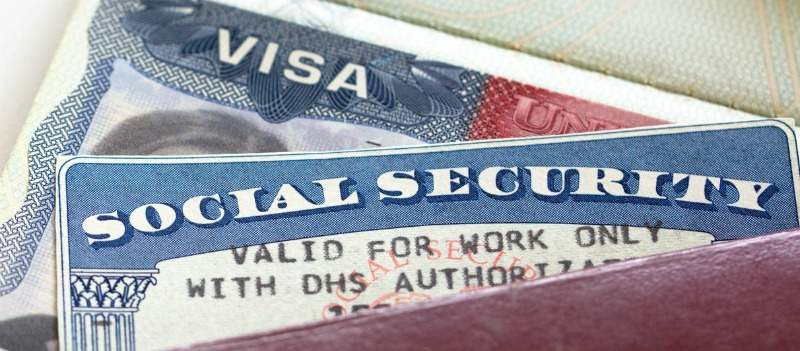International students who wish to work in the United States must obtain a Social Security Number (SSN). An SSN is a unique nine-digit identification number issued by the U.S. Social Security Administration (SSA) to individuals who are eligible to work in the United States. The SSN is used to track an individual’s earnings and work history and is required for various purposes, including filing taxes, opening a bank account, and applying for credit.

Getting an SSN as an international student can be a confusing and daunting process. However, with the right information and guidance, it can be a straightforward and hassle-free process. International students on an F-1 or M-1 visa can obtain an SSN after receiving authorization to work in the United States from their Designated School Official (DSO). On the other hand, J-1 students, student interns, or international visitors must provide a letter from their sponsor to obtain an SSN. The letter should be on sponsor letterhead and include the student’s name, date of birth, and a statement indicating the need for an SSN.
Eligibility for SSN as an International Student
Understanding SSN and Its Importance
A Social Security Number (SSN) is a unique nine-digit number assigned by the United States government to its citizens, residents, and eligible foreign nationals. The SSN is used for various purposes, including tax reporting, employment, and accessing government services. It is an essential document for international students who want to work and earn money in the United States.
International students who hold an F-1 or J-1 visa and have a valid work permit are eligible to apply for an SSN. The SSN is required by the Internal Revenue Service (IRS) and the Social Security Administration (SSA) for tax purposes. Students who do not have an SSN may face difficulties in opening a bank account, applying for credit cards, or obtaining a driver’s license.
Eligibility Criteria for F-1 and J-1 Students
To be eligible for an SSN, F-1 and J-1 students must meet certain criteria. The eligibility criteria for F-1 and J-1 students are as follows:
- The student must have a valid F-1 or J-1 visa.
- The student must be enrolled full-time in an academic program or have completed their studies and have applied for Optional Practical Training (OPT).
- The student must have a job offer from an employer in the United States.
- The student must have a valid work permit, such as Form I-766 (Employment Authorization Document) from the Department of Homeland Security (DHS).
- The student must have a valid I-20 (Certificate of Eligibility for Nonimmigrant Student Status) or DS-2019 (Certificate of Eligibility for Exchange Visitor Status) issued by their school or program sponsor.
It is important to note that international students who are not eligible for an SSN can still apply for an Individual Taxpayer Identification Number (ITIN) from the IRS. The ITIN is a nine-digit number that is used for tax purposes only and does not confer any immigration status or work authorization.
In conclusion, international students who hold an F-1 or J-1 visa and have a valid work permit are eligible to apply for an SSN. The SSN is an essential document for international students who want to work and earn money in the United States. It is important for students to understand the eligibility criteria and the importance of the SSN to avoid any difficulties in their daily lives.
SSN Application Process
International students who are authorized to work in the United States must apply for a Social Security Number (SSN) to report their earnings and pay taxes. Here are the steps to apply for an SSN:
Required Documentation
To apply for a Social Security Number, international students must bring their passport, Form I-20 (for F-1 students) or DS-2019 (for J-1 students), and an Employment Authorization Document (EAD) if they have one. Additionally, they must provide a job offer letter from their employer.
Steps to Apply for a Social Security Number
International students can apply for an SSN by visiting their designated school official (DSO) who will provide them with a letter verifying their eligibility to work on-campus or off-campus. The DSO will also provide them with a completed Form SS-5 (Application for a Social Security Card). International students must then take the completed Form SS-5 and the required documentation mentioned above to their local Social Security Administration (SSA) office.
At the SSA office, international students must fill out an application for a Social Security Number and submit their completed Form SS-5 and required documentation. They may also be asked to provide additional documentation based on their individual circumstances.
After Submission: Processing Time and Follow-Up
The processing time for an SSN application can vary, but it usually takes about two to four weeks. Once the application is processed, the student will receive a Social Security card in the mail at the address they provided on the application. If the student has not received their SSN card after four weeks, they should follow up with their local SSA office.
In summary, to apply for a Social Security Number, international students must first obtain the necessary documentation, including a job offer letter and a completed Form SS-5. They must then visit their local SSA office to submit their application and required documentation. After submission, they should expect to receive their SSN card in the mail within two to four weeks.
Employment and Tax Implications
International students who wish to work in the United States must obtain a Social Security Number (SSN) to be eligible for employment. This section will discuss the employment and tax implications of obtaining an SSN as an international student.
On-Campus vs. Off-Campus Employment
International students who hold an F-1 visa are eligible for on-campus employment for up to 20 hours per week during the academic year. On-campus employment includes work for the university or college, such as working in the library or cafeteria.
Off-campus employment, on the other hand, requires authorization from the US Citizenship and Immigration Services (USCIS). International students who are in good academic standing and have completed one academic year of study may apply for Curricular Practical Training (CPT) or Optional Practical Training (OPT) authorization. CPT is for employment that is directly related to a student’s major field of study, while OPT is for employment that is related to a student’s major field of study and is optional.
Understanding Tax Responsibilities for SSN Holders
International students who hold an SSN are subject to federal, state, and local taxes. Employers are required to withhold taxes from their employees’ paychecks and report the tax withholdings to the Internal Revenue Service (IRS).
International students who hold an SSN and earn income in the United States are required to file a tax return with the IRS. If an international student earns income but is not eligible for an SSN, they must apply for an Individual Taxpayer Identification Number (ITIN) to file a tax return.
It is important for international students to understand their tax responsibilities and to keep accurate records of their income and tax withholdings. The IRS provides resources and assistance to help international students understand their tax obligations, including the Foreign Student Liability for Social Security and Medicare Taxes source and the International Students and Social Security Numbers source publications.
Maintaining and Protecting Your SSN
As an international student, it is important to maintain and protect your Social Security Number (SSN). Your SSN is a unique nine-digit number that identifies you for tax purposes and other government benefits. It is essential to keep your SSN safe and secure to avoid identity theft and other fraudulent activities.
Safe Usage of Your Social Security Number
To ensure the safe usage of your SSN, follow these guidelines:
- Never carry your Social Security card with you unless it is absolutely necessary. Keep it in a secure location such as a locked safe or file cabinet.
- Do not give out your SSN unless it is required by law or for a legitimate reason such as employment or credit applications.
- Be cautious when giving your SSN over the phone or online. Make sure you are dealing with a reputable company or organization.
- Monitor your credit reports regularly to detect any unauthorized use of your SSN.
What To Do If Your SSN Is Lost or Stolen
If you suspect that your SSN has been lost or stolen, take the following steps:
- Contact the Social Security Administration (SSA) immediately to report the loss or theft. You can visit your local SSA office or call them at 1-800-772-1213.
- Request a replacement Social Security card if necessary. You will need to fill out an application and provide proof of your identity.
- Monitor your credit reports and financial statements for any suspicious activity. Consider placing a fraud alert or credit freeze on your accounts to prevent unauthorized access.
- Report any fraudulent activity to the appropriate authorities such as the Federal Trade Commission (FTC) or local law enforcement.
By following these guidelines, you can help protect your SSN and prevent identity theft. Remember to always be vigilant and cautious when handling your personal information.
Frequently Asked Questions
What documents are required for an F1 student to apply for a Social Security Number (SSN)?
To apply for a Social Security number (SSN), F1 students must provide the following documents:
- A valid passport
- A valid I-94 card
- A valid Form I-20
- A letter from the Designated School Official (DSO) stating that the student is eligible for employment and that the employment is necessary to fulfill academic requirements or economic hardship.
Is it possible for international students to obtain a Social Security Number (SSN) without having a job?
No, international students cannot obtain a Social Security number (SSN) without having a job. The Social Security Administration (SSA) issues SSNs only to individuals who have employment or tax reporting requirements.
What are the steps for an international student to apply for a Social Security Number in the USA?
The steps for an international student to apply for a Social Security number (SSN) are as follows:
- Obtain a job offer from an employer in the United States.
- Obtain a letter of verification from the school’s international student office.
- Complete an Application for a Social Security Card (Form SS-5).
- Visit a Social Security Administration (SSA) office with your Form SS-5, job offer letter, verification letter, and other required documents.
What benefits do international students receive from having a Social Security Number (SSN)?
Having a Social Security number (SSN) allows international students to:
- Work legally in the United States.
- Pay taxes on their earnings.
- Open a bank account.
- Apply for credit or loans.
- Rent an apartment.
- Obtain a driver’s license.
Are F2 visa holders eligible to apply for a Social Security Number (SSN)?
No, F2 visa holders are not eligible to apply for a Social Security number (SSN) unless they have employment authorization from the United States Citizenship and Immigration Services (USCIS).
Can F-1 students apply for a green card, and how does it affect their SSN eligibility?
Yes, F-1 students can apply for a green card. However, the process of obtaining a green card can take several years, and it may affect their eligibility for a Social Security number (SSN) during that time. F-1 students should consult with an immigration attorney to understand how applying for a green card may affect their SSN eligibility.











